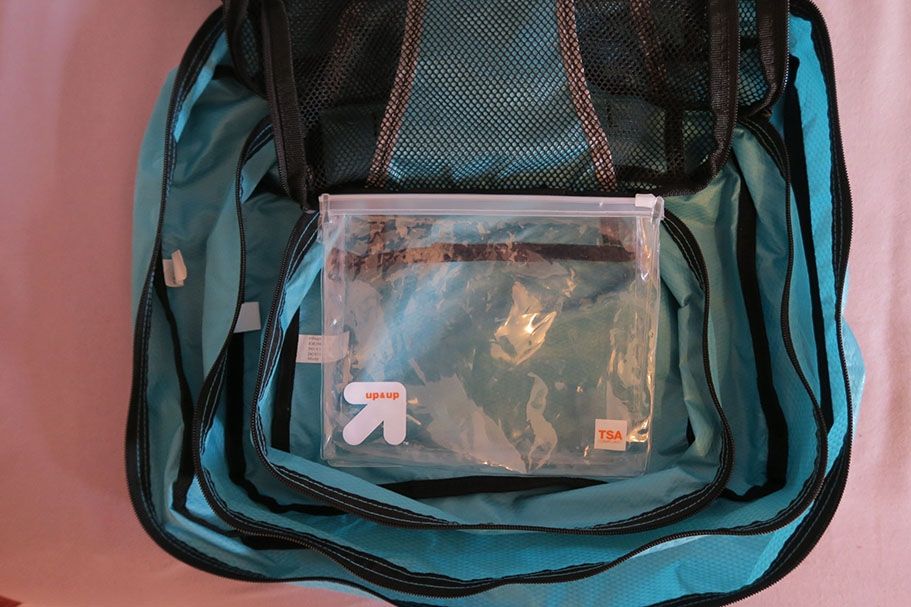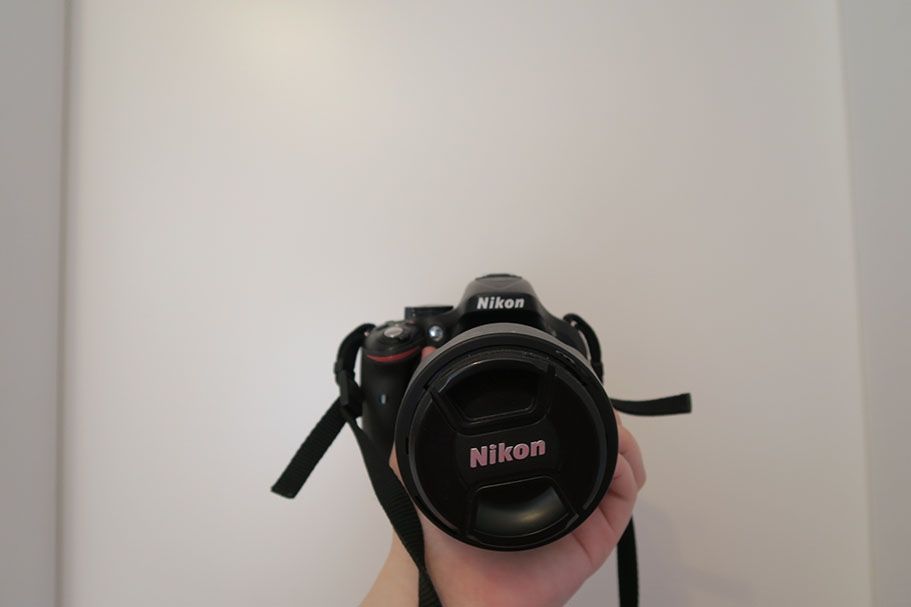Your Life in a Suitcase
Unless you plan on carrying a years worth of supplies from the U.S. to Germany, you're going to need a suitcase. Make it one that's sturdy, easy to wheel around, and large enough to fit everything you need in it, but small enough to comply with the airlines standard. Don't forget to attach a luggage tag with your name, new address, email, and phone number. The last thing you want is to arrive in Germany for a year without your luggage!
Locking your suitcase is optional, but if you value the contents of your luggage, consider using a TSA-approved luggage lock. You can also lock your hostel locker with this.
Choose your luggage wisely. You are allowed one piece of checked luggage, one carry-on, and one personal item. For this reason I chose to bring a big suitcase to check, a backpack as my carry-on, and a bigger purse as my personal item. Bringing the backpack was a good idea because not only could I fit a lot in it at a time (even my laptop), but I could use it for school and weekend trips.
The black purse is what I used coming here as my personal item, but because I stuffed it completely full, it's falling apart and I will unfortunately be unable to use it coming back. At the time, it was a good idea because I was also able to fit my smaller brown purse into it. This saved me weight and space in my checked suitcase and allowed me to easily find all my important items (money, passport, phone) inside my brown purse.
A tip to help keep you organized is to use packing cubes. These can help you separate your liquids, delicates, shirts, and pants.
Important Documents
There are many important papers that you should bring along to Germany. I recommend keeping them all together in a folder so that when you're asked for one of them, you know exactly where they are. My recommendations are to bring your high school transcript, a colored copy of your passport, a copy of the information about your host family, a copy of the program rules/guide, a copy of your insurance information, your airline tickets, and your immunization records. Keep this folder in one of your carry-ons.
Your passport is obviously the key to beginning your journey. Know where it is at all times, and don't forget to make two colored copies of it. Leave one with your family at home and bring one with you. God forbid that you lose it, but with this copy, getting a new one will go much smoother.
Let's talk cards. If you received an insurance card, take that with you just in case. I've never had to use mine, but in the event that I ever would, I always know where it is. Next is your ID from your high school. I've also never used this, but if you're going to be visiting any museums, many times you will get a discounted rate when showing them your student ID. You're going to need someway to access your money while studying abroad. I chose to bring along my debit card. This allows me to go to any ATM and withdraw from my checking account. I do have to pay small withdrawal/international fees, but it's much more practical than swiping my card everywhere. Many business still do not allow you to pay with cards, so having cash on you is a must. Last would be your driver's permit/license. This is just a secondary form of identification, as you won't be driving in Germany.
I would recommend having at least €200 ahead of time. Most likely, you're going to be so busy adjusting to your new surroundings the first two weeks or so that you might not have time to withdraw from an ATM. Another ATM tip is to withdraw larger amounts at a time, so that you get the best USD to Euro rate possible. Consider withdrawing once a month, enough to last you the whole month (approximately €100-300 depending on your needs). Take into account any personal expenses (toiletries, school supplies, clothing, recreation, transportation) and any upcoming trips. There are several optional trips planned throughout the year that are not included in the original program fee. If you're planning on taking part in these trips, budget those into your monthly ATM withdrawal.
Technology
If you own a laptop, bring it. Having my own laptop is helpful for school projects, keeping in contact with friends and family, getting college things into order (if you're studying abroad during your senior year like me), and of course posting on this blog.
If you're the kind of person who likes to remember your adventures through photographs, consider bringing along a camera, not just your phone.
Germany and the U.S. have different outlets. German outlets supply energy at 220-240 volts while the U.S. operates at only 110-120 volts. This means that if you are considering bringing along a hairdryer or flat iron, you'll also need to bring a converter along. In my opinion, it's cheaper and more effective to just purchase those in Germany or borrow from your host family instead of having to deal with a converter. Lots of products such as phone chargers and laptop cords are dual voltage, which means that you will be able to use them with only an outlet adapter. To see if your product is dual voltage, read the writing on the back of the wall plugin. You can purchase good international adapters for under $10 on Amazon. I would recommend bringing AT LEAST two, one for your laptop and one for charging your phone/camera batteries. Try to find ones with long prongs because the outlets in Germany are often set further into the wall than American outlets.
Your first week as an exchange student is going to be hectic. You'll most likely be traveling from your home state to Boston for pre-departure orientation, then flying from Boston to Frankfurt, attending in-country orientation, and then traveling to your host family. Finding time (and outlets) to charge your devices might be a challenge. That's why I recommend bringing a portable charger with you. This device allows you to give your phone a quick charge while on the airplane or while riding the train.
While you're in Germany, you're going to want to keep in contact with your family and friends from both countries. Two of the most popular options are purchasing a new phone to use only for your German contacts or picking up an international SIM card to use in your normal phone. I chose to take the SIM card route. My host mom took me to ALDI (a German supermarket chain) and helped get me set up with an ALDI TALK package. This package gives me internet so that I can use Whatsapp, the main texting app in Germany, to contact people. I buy a €5 credit every month from ALDI and then I pay €3.99 for 150 MB of high-speed data. 150 MB is not very much data, but after that runs out I still have data, it just works slower. You might have to call your American cell provider to unlock your phone for use with a new SIM which might take a while, so keep this in mind.
Keep all of your important chargers (laptop, phone, camera, power bank) and other tech items (SD cards, headphones, camera batteries, etc.) in a plastic bag in one of your carry-ons. This helps you keep everything organized and you won't be freaking out when you get to Germany and can't find your phone charger.
Personal Items/Toiletries
When possible, use travel-size products. Shampoo, conditioner, lotion, toothpaste, body wash, razors, toothbrushes, hairbrushes, and face wash are all things that you should be able to purchase within your first two weeks in Germany. Transfer your products into travel-size containers that will last you the week until you get to your host family and put all your liquids that will be staying in your suitcase in a plastic bag. Opening your suitcase and seeing everything covered in shampoo can really put a damper on your first days abroad.
This item is just a preference, but still one worth noting. No one uses solid deodorant in Germany. Ok, maybe not no one, but I have yet to find any solid deodorant in drugstores. Instead, they use spray-on deodorant. This goes for any of your favorite products, things that you use consistently and don't want to substitute.
If you're someone who wears makeup on a regular basis, by all means bring what you use. But if you're not, don't bring a bunch of products that you rarely use at home and expect that you'll somehow magically use them all the time in Germany. The same thing goes for nail polish. Bring only the necessities.
Before you leave for your exchange, you'll need to make sure you have a (half) years worth of any medication that you may be on and a copy of your prescription, just in case. It's much less of a hassle to get your medication beforehand than trying to deal with German pharmacies.
Medication is tricky in Germany. Normal grocery stores and drugstores do not sell everyday medication such as ibuprofen, instead you'll have to go to a separate pharmacy. Often these medications are more expensive in Germany, so taking along a bottle of pain relieving pills is a good idea.
If you wear glasses or contacts, don't forget to stick them in one of your carry-ons. Bringing along a pair of sunglasses also isn't a bad idea.
Your first week or so into the program will be full of hostel bathrooms. Do not forget to bring along a towel and a wash cloth.
Clothing
Depending on which state in Germany you are placed in, the weather is obviously going to change. However, I live in North Rhine-Westphalia which is said to have the mildest weather. My best advice would be to look into the climate of your entire state instead of trying to Google the city you are placed in, unless it is a well-known and large city such as Berlin, Munich, or Cologne. You can also email your host family beforehand and ask them. Even if you will be living somewhere with a mild climate, I would recommend bringing along a rain jacket/light jacket. Save room in your suitcase by leaving your bulky winter jacket at home and buying one once the colder months roll around. An alternative would be to wear it on the plane, even though it will most likely still be upwards of 70 degrees outside. Sometimes an exchange student has got to do what an exchange student has got to do to save a few bucks.
Americans dress much more casually than Germans. You aren't going to be able to show up to school in sweatpants and a shirt from one of your soccer tournaments. Take this change of scenery as an opportunity to explore and embrace German fashion.
I would bring no less than four pairs of jeans, unless you're planning on buying them in Germany. I only brought along three pairs and had to have my mom send me another. Depending on how often your host family does laundry, you might be wearing the same jeans multiple times without them being washed. Lots of German families prefer drying their laundry on clotheslines, so one load of laundry usually lasts from start to finish at least a full day. You can also substitute a pair of jeans for a skirt or shorts if you prefer them.
All of my opinions on shirts to bring are completely based on the climate of where I live, so make sure you look into yours yourself. Think of it like this; it will probably be cold 2/5 of the time and warmer 3/5 of the time. Bringing short sleeve tees that can go under sweatshirts in the colder months is much more practical than bringing lots of long sleeve tees that can only be worn when it's cold out. I didn't bring along enough shirts, so lots of these are tees I bought here. Unless you want to wear the same five shirts to school every week, bring along at least 10 short sleeve t-shirts. Just like in the U.S., everyone has their own taste in fashion. If you're worried about sticking out because of your clothes, it's pretty safe to bring solid color/non-patterned shirts. Once you figure out what's normal in your school, you can start to get into the trends, if that matters to you. If dresses are your things, bring along one or two, but only if you know for sure that you will wear them.
Again, depending on your climate and preference, bring 3-5 long sleeve shirts.
Tank tops are a good idea because you can wear them alone when it's hot out or wear them with a cardigan when it's cooler. They also don't take up much space in your suitcase.
For sweatshirts, I recommend bringing one that can over any shirt (something in a neutral color) and then one more casual sweatshirt for around the house. Whether they are hooded or zipped is totally up to you. Cardigans are helpful for when it starts to get colder. Don't bring more than three hooodies/cardigans/sweatshirts. They're usually bulky and take up lots of room.
Bring along no less than ten days worth of socks and underwear. You may be able to get away with wearing the same jeans for a while, but you can't do this with socks and underwear. Don't forget at least one swimsuit also.
Even if you don't work out, bringing along athletic clothing and shoes is a necessity. At your Gymnasium (German high school) you will have to take gym class. While wearing shorts to gym class in the U.S. is normal, I was the only girl at my school on the first day of class wearing athletic shorts, even though it was over 70 degrees outside. Because of this, I asked my mom to send me some sweatpants. Skip the hassle of shipping internationally by bringing along sweatpants for gym class.
Depending on your pajama preference, I would bring at least two sets of clothes to sleep in, maybe one for colder weather and one for warmer weather. You'll likely buy some touristy t-shirts that you can sleep in during your time in Germany and you should also get two t-shirts from Ciee/Experiment that work great for this purpose.
Throughout the course of a (half) year, it's likely that you'll attend at least one formal event. For this reason, be sure to pack at least one nice dress or a dress shirt and dress pants and the appropriate footwear.
Don't go overboard on shoes. They take up lots of space in your luggage and weigh a lot. Just like clothes, you will probably purchase at least one new pair over the course of the (half) year.
Apparently it's very common in Europe for people to wear house shoes/slippers inside. I brought some along because they were recommended to me, but I ended up wearing them only a couple of times. A good alternative that doubles for those cold winter days would be bringing warm fluffy socks. These will save you space in your suitcase.
Miscellaneous
Another way to document your exchange is to keep a journal. I attempted to keep up with mine, but gave up after about four months. Nevertheless, if journaling is your thing, then bring along a medium sized notebook and a pen/pencil to write with. For journaling, I really like the ones from Moleskine. The line spacing is ideal for writing and it's held closed by an elastic band.
Something really important is to bring along things that remind you of home. Whether that's pictures of your family and friends, your favorite snack, your favorite book or movie, your favorite blanket, or letters from home, do not forget this! Having something familiar and close to your heart as you transition into life in another country is an essential. I chose to print out pictures of my family and friends and put them on my wall. That way, I could wake up and see something familiar before I started my day in another country.
This one is definitely optional, but I'm super glad I packed it. During your "Welcome to Germany" orientation, you're going to be meeting students from all over the world and taking lots of pictures. Throughout our first days in Germany, there was no shortage of photo-ops taken with our various flags draped around us.
So the reason you're packing is because you are essentially moving thousands of miles away to live with strangers. Sounds scary, I know. To show your appreciation that these people have opened their homes to you for an extended amount of time, don't forget to pick up your future host family a little something from your area. It doesn't have to be big and expensive, just something that tells them something about where you're from! Some gift ideas are foods that are uncommon in Germany (maple syrup, Reese's, foods specific to your region), books about your state, and other souvenir-esque items (magnets, snow globes, keychains).
Something that you probably wouldn't think about is bringing a reusable water bottle. If you don't like the carbonated water that is very common in Germany, bringing a bottle that you can fill up with tap water is a good idea.
The most obvious difference between the U.S. and Germany is the languages. Whether you've taken 4+ years of German or none at all, you will encounter many words that you've never heard before. I would highly recommend taking along a German-English dictionary. Try to get one that's relatively small but has a wide range of words within. Now of course you aren't going to always have this dictionary with you, but it's still a good alternative to translation apps on your phone or Google, especially when you're writing tests. When you use an actual dictionary you know that the information is reliable and will give you the correct pronunciation and case (der, die, das, die). I keep a little notebook where I write down new words that I hear and then when I get home I use my dictionary to look them up.

If you enjoy reading, bring alone a book or two or an ebook. They're great for the seven hour plane ride or when you just need a break from reading German all day at school. Don't go overboard and bring as many as I did, because books tend to weigh a lot, take up lots of space, and most likely you'll be too busy to read.
No matter where you end up, it's going to rain sometime. Bringing a small umbrella takes up little space and keeps you dry. If you're bringing a backpack, tuck your water bottle in one side pocket and the umbrella in the other.
Additional tips:
- Don't waste space in your suitcase by bringing along school supplies. You can easily purchase notebooks and writing utensils the first week you get to Germany. The only school item I would recommend bringing is a graphing calculator. They are very expensive and if you already own one, it makes much more sense to bring it with.
- Call your bank ahead of time and notify them that your credit/debit card will be used abroad for the next (half) year. This should ensure that accessing your money goes smoothly.
- Don't stress out about packing. You'll be able to purchase all of the necessities when you arrive in your new home. And don't wait until the day before your departure to start packing. Do yourself a solid and do your packing over a week or more.
Related Posts
Going Back Home
I’m back home now, in a suburb of Boston where I will be a high school senior in the fall. When I see friends or bump into neighbors, they smile... keep reading
A Visit from My Parents
After eight months of living in Germany with my host family, I was really excited when my parents told me they would be coming to visit over my two week... keep reading
Keeping in Touch
A difficult part of living away from home for any amount of time is staying in touch with friends and family. I have made so many great relationships with people... keep reading
































